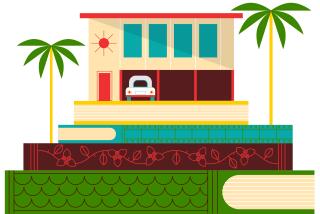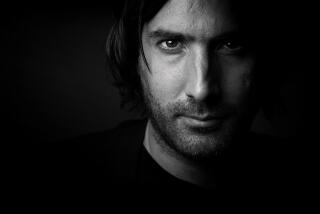It’s in the Mail : A mysterious love letter turns up in the bill pile : THE LOVE LETTER, <i> By Cathleen Schine (Houghton Mifflin: $19.95; 257 pp.)</i>
The pursuit of happiness may be one of those inalienable rights guaranteed by our founding fathers, but it’s not always a particularly noble nor a worthwhile pursuit. Some philosophers might even deem it a wild-goose chase. Happiness, they would argue, is a byproduct of an activity in which the nagging demands of the self are temporarily silenced. By its very nature happiness cannot be willfully tracked and hunted down.
In her fourth novel, “The Love Letter,” Cathleen Schine gives us a heroine of sorts who is not at all shy about admitting the importance of comfort in her life. “She believed in happiness,” Schine writes about 42-year-old Helen MacFarquhar, “or at least removing as many barriers to happiness as possible.”
And it seems at first that Helen, a divorced mother who never finished her dissertation on the vorticist Wyndham Lewis, has come as close to this elusive quarry as anyone in this day and age can dare hope. Though the pink bookstore she owns in the demure seaside town of Pequot barely breaks even, she loves her work and glories in her personal touch with customers, both locals and visiting New Yorkers who “wandered into the store looking for the latest novel by John Grisham and came out with two by Julian Barnes. . . .”
Throughout this elegant novel Schine’s celebration of the vagaries and quiet pleasures of everyday life is an incomparable delight. With the supreme art of making her skill seem effortless, she pivots a sentence on a droll verb (“Blue birds, a pair, had grazed on Helen’s lawn, as openly as fat Guernsey cows”) or alights on an unexpected yet perfect adjective (“dirigible bees”).
But Helen’s idyllic world of clarity, sense and humor does not remain pristine for long. A mysterious love letter somehow manages to worm its way into a pile of bills, checks and junk mail. Addressed simply to a “Dear Goat” from a certain “Ram,” the letter smolders with enough bitter longing and austerely repressed sensuality to fire any reader’s imagination. Indeed, in its gaunt simplicity the letter is so cunningly crafted that the repeated scrutiny it receives throughout the novel is never tiresome.
The somewhat inchoate summer days of Pequot’s amiable, quirky citizens are now given shape by an element of suspense. Was it just an accident that the letter came into Helen’s hands? Did a man or a woman send it? The suspects include a married psychiatrist who has written about “the difficulty of discriminating between manic behavior in the very rich and rich behavior in the very rich.” Then there is the manager of Helen’s bookstore. With a name that makes her sound like an ivy-covered brick building on a Seven Sisters campus, Lucy Dodge Hall exudes an air of WASP privilege that allows her to speak her mind to Helen (“You really are unpleasant to work with”) and to get a tattoo on her middle-aged ankle.
More problematical than the letter itself, though, is Helen’s growing involvement with one of her employees, a college student on the verge of turning 21. With a mouth like Jeanne Moreau’s, Johnny Howell “believed deeply in his own superiority, but only deeply. On the surface . . . Johnny worried and judged and brought himself to task.” Helen knows their affair has no future, yet not even Johnny’s misuse of the word hopefully makes an end seem possible.
If Helen trusted her conscience more--or didn’t have one to begin with--her dilemma over Johnny would be more easily resolved. But the “moral clarity” that forbids her to continue seeing him is muddied by a passion that makes her feel helpless and impractical. “Your life is complicated and silly,” she muses. “This was not the kind of happiness you meant. . . . You did not mean to discover pain in the name of joy.”
In Schine’s previous novel, “Rameau’s Niece,” the problem of unsuitable attachments--as Barbara Pym would call them--was solved by various comic devices that led the heroine back to her incredibly wonderful husband. Here in “The Love Letter,” the main characters seem less brittle and schematic, more fully human in their groping, futile self-deception. As a result, there is a hint of tragedy in the air, foreshadowed early on when we learn that Helen “felt most amiable, most kindly disposed toward her fellow man--when she was alone.”
Yet by limiting the scope of this novel’s primary dramatic action to a single summer, Schine seems to retreat from the sterner realities of less pleasant seasons. Though the solution to the mystery of the love letter is delightfully clever, it may not persuade some readers that Helen has really come to terms with the darker side of her passion, a selfishness that would destroy the very happiness it demands. But our disappointment on this score is something of a tribute to Cathleen Schine’s potential, which, as Johnny might say, is totally awesome.
More to Read
Sign up for our Book Club newsletter
Get the latest news, events and more from the Los Angeles Times Book Club, and help us get L.A. reading and talking.
You may occasionally receive promotional content from the Los Angeles Times.






